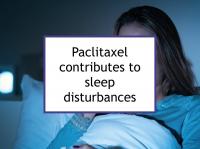Much like peripheral neuropathy, problems with sleep and increased fatigue induced by paclitaxel chemotherapy appear to be caused by its toxicity. Now a new study has reported that paclitaxel disrupts circadian rhythms (resulting in sleep disturbances) and that the disruption occurs at the level of the suprachiasmatic nuclei (SCN), the principal molecular clock of the hypothalamus.
Disrupted sleep has been reported to increase breast cancer risk and shorten disease-free survival of breast cancer survivors. Factors such as night shift work and sleeping in the presence of light appear to increase breast cancer risk by disturbing the production of melatonin, a hormone known for its involvement in the regulation of circadian rhythms. However, paclitaxel-induced sleep disturbances impair circadian rhythms in a different manner, as described in the study.
Strategies to deal with paclitaxel-induced sleep disturbances
Those affected by paclitaxel-induced sleep disturbances may find it reassuring to know that these symptoms have a specific cause, especially since they may persist for long periods of time. Generally speaking, strict adherence to recommended sleep hygiene practices (keeping to a regular sleep schedule and relaxing bedtime routine, maintaining a cool, dark sleep environment, using the bed for sleep only), as well as avoiding caffeine, managing symptoms such as pain, and getting regular exercise well before bedtime have been shown to improve sleep quality. However, such efforts might not succeed in extending contiguous sleep time in those affected by paclitaxel-induced disrupted circadian rhythms.
In such cases, when intensive efforts to extend sleep duration beyond four to five hours per night have failed, ensuring a total of at least six to seven hours of sleep per 24-hour period by taking long naps during the day might be beneficial. This is in contrast to common advice to keep daytime naps short, which makes sense for those with insomnia due to other causes who might have trouble falling asleep at night after a long nap during the day.
Deep sleep for a period during the day would help maintain cognitive health by giving the brain more opportunity to clear waste products and perform other brain maintenance functions. Long-term use of prescription and over-the-counter sleep aides are to be avoided since they may adversely affect cognition over time. However, note that whether obtaining adequate sleep through napping extinguishes the increased risk of breast cancer recurrence associated with sleep deprivation has not been established.
Latest research describes paclitaxel-induced circadian disruptions
The study referenced above was designed to determine how paclitaxel affects the SCN molecular clock, as well as to examine related behavioral adaptations to paclitaxel-induced circadian disturbances in female mice. The SCN is the principal molecular clock of the hypothalamus, incorporating individual SCN neurons that generate a rhythm or oscillation of approximately 24 hours. Many physiological processes, including sleep, are regulated in a circadian fashion. Until now, it has not been determined how chemotherapy disrupts circadian rhythms, in particular the extent to which these disruptions occur at the level of the principal clock.
To conduct the study, the authors subjected mice to chemotherapy regimens consisting of repeated paclitaxel treatments. Rhythmic SCN expression of molecular clock and circadian-associated transcripts were measured under normal conditions and after treatment. Chemotherapy was found to disrupt the SCN molecular clock by abolishing rhythmicity and dampening rhythmic transcription of key molecular clock genes.
The authors also assessed chemotherapy-induced alterations in SCN function in mice. First, they measured wheel running under normal conditions and under a jet lag phase-delay or phase-advance paradigm, thereby generating a phase response curve for comparison purposes. Paclitaxel chemotherapy was found to alter mouse circadian rhythms in ways indicative of disrupted SCN-dependent entrainment (the process by which the SCN uses environmental cues such as light to align the body's internal rhythms).
The authors conclude that paclitaxel appears to disrupt both the molecular clock and functional re-entrainment of the SCN, thereby causing or contributing to observed circadian rhythm disruptions after treatment. This research "could help guide application of circadian-mediated therapies to mitigate side effects of chemotherapy," according to the authors.
Please see our paclitaxel and circadian rhythms tags for more information.
